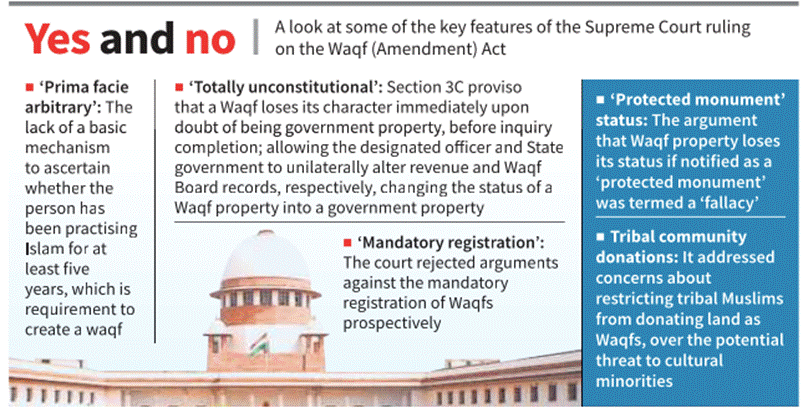Basics
- Waqf: Permanent dedication of movable/immovable property by a Muslim for religious, pious, or charitable purposes under Islamic law. Property becomes inalienable and is managed by Waqf boards.
- Waqf Act, 1995: Governs administration, registration, and supervision of Waqf properties in India.
- Amendment 2025: Brought major changes—definition of Waqf, inclusion of non-Muslims in Waqf boards, powers of collectors, and new tribunal rules.
- Fact: India has over 8 lakh registered Waqf properties, making it one of the largest owners of land after defence and railways.
Relevance :
- GS-II: Polity (Minority Rights, Secularism, Judicial Review), Governance (Boards, Collectors, Tribunals).

Why in News
- The Supreme Court (Sept 15, 2025) passed an interim order staying certain provisions of the Waqf (Amendment) Act, 2025, pending constitutional validity hearings.
- Key stayed provisions:
- Changes in composition of Waqf boards (inclusion of non-Muslims).
- Collector’s enhanced powers in property verification.
- Tribunal provisions allowing non-Muslim majority.
Significance
- Polity: Tests constitutional validity of minority rights vs state regulatory powers.
- Governance: Impacts functioning of Waqf boards and local administration.
- Society: Sensitive issue, may trigger minority apprehensions over property rights.
- Economy: Large land holdings linked to real estate, urban planning, and infrastructure development.
Overview
Polity/Legal
- Raises questions on constitutional validity of altering minority-controlled boards.
- Judicial review of Parliament’s power to restructure religious charitable institutions.
- Tension between secular governance and minority autonomy.
Governance/Administrative
- Collectors given quasi-judicial authority over Waqf property disputes may blur executive-judicial roles.
- Non-Muslim inclusion in boards could improve transparency but also risk legitimacy among stakeholders.
- Tribunal framework may reduce litigation backlog but requires neutrality.
Economy
- Unlocking underutilised Waqf lands could aid housing, education, and infrastructure projects.
- Risk of alienation/dispossession of properties could lead to prolonged disputes, slowing urban development.
Society
- Sensitive minority issue; perceived encroachment on autonomy could fuel distrust.
- On the other hand, improved oversight may reduce corruption and misuse.
International
- India’s handling of minority endowments may be scrutinised globally, especially by OIC nations.
- Comparative models: UK’s Charity Commission regulates faith-based trusts with state oversight but community representation.
Challenges
- Balancing minority rights with state accountability.
- Preventing politicisation of sensitive religious property laws.
- Ensuring transparency without alienating communities.
- Managing massive litigation backlog on Waqf land disputes.
- Avoiding perception of majoritarian control over minority institutions.
Way Forward
- Committee-based approach: Similar to Sachar Committee, set up expert group for inclusive reforms.
- Digitisation of records: Use GIS mapping of Waqf lands for transparency (NITI Aayog Digital India push).
- Independent regulatory body: Modeled on UK Charity Commission for oversight without political interference.
- ADR/tribunals: Strengthen mediation mechanisms to resolve disputes outside regular courts.
- Stakeholder consultation: Ensure Muslim community participation in reform process for trust-building.
Conclusion
The SC’s interim order balances status quo with constitutional scrutiny. Going forward, reforms must combine transparency, accountability, and minority autonomy, ensuring governance does not erode community trust.



